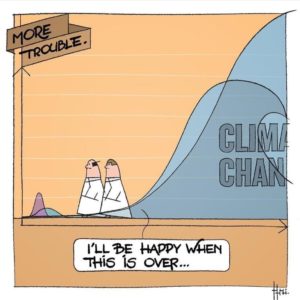Improvise. Adapt. Overcome. Four urgent appeals to policy makers
April 3, 2020 – How can we fight the Coronavirus, manage the threat of another financial crisis, and at the same time tackle climate change? Will there be enough capital to deal with them? An appeal to policy makers to give a strong green emphasis to all Covid-19 emergency funds, introduce a floor to the carbon price, give basic income to all and go full speed with the Circular Economy Action Plan (CEAP).
by Arthur ten Wolde, Head of Circular Future
The current Corona crisis has an impact on our lives that exceeds everything most of us have experienced during our entire lifetime. With deaths already exceeding 50.000, over 1 million cases and emergency intensive care units being installed in a growing number of countries across the globe, one government after another has installed various degrees of lockdown with social distancing. It is a crisis at multiple levels: personal tragedy, financial uncertainty, job insecurity, but also economic uncertainty at the country and global level, with services and production coming to a standstill and stock markets responding. In 2019, Greta Thunberg referred to climate change when she said: “People are dying. People are suffering. This is a crisis.” Now we have a crisis-upon-crisis-upon-crisis: climate, Covid-19 and the risk of a recession.
On the positive side, there is no loss without gain. People are more equal and feel somehow united in their social distancing; online connectivity is booming; and health care workers, teachers and politicians have regained the respect they deserve for the sometimes heroic ways in which they are dealing with Covid-19. Importantly, we have all seen the astounding power of governments to slow down the world economy in a matter of days. So why did it take decades to do so little for the climate crisis? Why did we not learn from the 2008 credit crunch? How can we use this power of governments and financial institutions to deal with the current triple crisis?
To answer these urgent questions, I believe the work from the Club of Rome deserves full attention. Their scenarios, starting with the 1972 report “Limits to growth”, describe the global economic development in terms like population, capital, production, resource use and pollution. [1, 2] Contrary to widespread belief that their model was flawed, it has been validated by scientists in 2008: actual data were in close agreement with the curves of the business-as-usual scenario from their “World-3” Model [3, 4, 5]. Importantly, this scenario describes a global economic slowdown between 2020 and 2030 along with a decreasing availability of capital. As more and more capital goes towards resource extraction, industrial output per capita starts to fall. [3, 4, 5] A more recent “World6” model confirmed that the supply of key metals such as iron, aluminium, copper and zinc, is likely to peak between 2020 and 2040, with extraction processes likely to exhibit increasing energy intensity and cost. [6] In addition, mounting pollution has impacts on the economy. [3, 4, 5]
The Cartoon on the right was posted on April 1 and is not intended to belittle the Corona Crisis; it depicts the long term impact of climate change and ecological destruction could be much worse even. Source: https://climatesafety.info/links-between-corona-and-climate/
The Club or Rome models were never meant to predict the future. Still, their business-as-usual scenario describes over 30 years pretty accurately. My main concern is: assuming the Club of Rome model is valid, how can we then use the available capital before it is too late?
Before we come to that, it is important to realise that all three crises are linked. First, there is scientific evidence that the risks of virus outbreaks like Corona are increasing due to ecological destruction. As habitat and biodiversity loss increase globally, the coronavirus outbreak may be just the beginning of mass pandemics [7, 8]. More research is urgently needed to further confirm and understand the link with disappearing ecosystems. Second, the 2008 financial crisis was a consequence of instabilities in our financial system, which has been fine-tuned to maximising financial profits regardless of environmental and social damage. Our current financial system amplifies the causes of climate change and Corona. In addition, loans were given at interest rates below the real risk, and financial derivatives have further removed investments from the real economy of goods and services. These flaws have not been removed since. Worse, the only possible response so far has been to further reduce interest rates, thereby increasing the financial bubble that has since spread out from real estate to all markets of the global economy. The funds needed to combat the immediate impact of the Corona crisis run a risk of creating hyperinflation. The recession could become more severe than that of 2008. [9, 10]
The risk of running out of capital is crucial because the transition to a low-carbon circular economy requires large investments. Not only in wind parks, solar panels and heat insulation, but also in industrial turnaround. This is why the European Commission recently proposed a large Just Transition Fund as part of the European Green Deal. But now the EU is not only dealing with the acute Corona crisis, it also needs funds of a similar magnitude to fight Covid-19!
Fortunately, there is a growing chorus for a green and just recovery from Covid-19, ranging from scientists, the UN, Club or Rome, Global Climate Strike movement, European Environmental Bureau, International Energy Agency, members of US Congress, European Central Bank and the European Commission [11-18]. The European EU heads of states are looking for a quick “exit” to get back to a normal functioning of our societies and to sustainable growth, drawing all lessons from the crisis. [19] As Frans Timmermans twittered: “We have short term and long term challenges to tackle, and the ability to manage both.”
Based on these recent calls for green and just recovery, my urgent appeal to policy makers in the EU and elsewhere is:
- Combine the Just Transition Fund for the EU Green Deal with the Covid-19 emergency funds: give a strong green emphasis to any social support program [2, 11, 12, 19]
- Set a minimum floor the carbon price to prevent further plummeting [15] and quickly agree on a goal of 55% CO2 emission reduction by 2030; [20]
- Extend the emergency income support towards structural universal basic income for all to make our economy far more resilient to face future crises; [12]
- Go full speed ahead with all measures necessary to create a circular economy, starting with the Circular Economy Action Plan (CEAP). Integrate additional measures proposed by Ecopreneur.eu, including a tax shift from labour to resources [21] and helping SMEs to become greener [21, 22]. Also add financial transaction taxes to steer investments towards the real economy. [23]
These measures would allow governments to address the triple crisis using the amount of capital that is currently available. Many of these measures have been proposed for decades but were, in the absence of a crisis, never implemented. As the US politician Rahm Emanuel said in 2008: “You never want a serious crisis to go to waste. It’s an opportunity to do things that you think you could not before. [24]
We have improvised our way out of the credit crunch and the onset of Covid-19. Now is the time to adapt our socio-economic system by taking holistic action. If we fail to do so in the coming months, the impact of an economic recession could start to deplete the availability of capital and even trigger hyperinflation [9], bringing us even further from home. The consequences of crossing planetary boundaries could then hit us with crisis after crisis until our impact has diminished. But if we do take action, we have a potentially unique opportunity to overcome the current crises and steer away from business-as-usual towards a future which is more resilient to shocks, safe, just, healthy, clean and prosperous.
This opinion of Arthur ten Wolde was written in his personal capacity as Head of Circular Future
For a pdf version please click here
References
[1] Club of Rome. (1972). The Limits to Growth (LTG), see https://en.wikipedia.org/wiki/The_Limits_to_Growth
[2] Project Syndicate. (2020). A Green Reboot After the Pandemic? Sandrine Dixson-Declève , Hunter Lovins, Hans Joachim Schellnhuber, Kate Raworth, Mar 24, 2020, available at https://www.project-syndicate.org/commentary/covid19-green-deal-by-sandrine-dixson-decleve-et-al-2020-03?
[3] Turner, G. (2014). ‘Is Global Collapse Imminent?’, MSSI Research Paper No. 4, Melbourne Sustainable Society Institute, The University of Melbourne, available at https://sustainable.unimelb.edu.au/__data/assets/pdf_file/0005/2763500/MSSI-ResearchPaper-4_Turner_2014.pdf
[4] The Guardian. (2104). Limits to Growth was right. New research shows we’re nearing collapse. Available at https://www.theguardian.com/commentisfree/2014/sep/02/limits-to-growth-was-right-new-research-shows-were-nearing-collapse
[5] Global Environmental Change. (2018) A comparison of The Limits to Growth with 30 years of reality. Graham M.Turner, Global Environmental Change Volume 18, Issue 3, August 2008, Pages 397-411, Elsevier. Available at https://doi.org/10.1016/j.gloenvcha.2008.05.001
[6] BioPhysical Economics and Resource Quality. (2019). Assessing the Long‑Term Global Sustainability of the Production and Supply for Stainless Steel. Harald Ulrik Sverdrup, Anna Hulda Olafsdottir, Springer, 27 April 2019. Available at https://doi.org/10.1007/s41247-019-0056-9
[7] The Guardian (2020b). ‘Tip of the iceberg’: is our destruction of nature responsible for Covid-19? 18 March 2020, Available at https://www.theguardian.com/environment/2020/mar/18/tip-of-the-iceberg-is-our-destruction-of-nature-responsible-for-covid-19-aoe
[8] The Royal Society. (2014). Global rise in human infectious disease outbreaks.
Katherine F. Smith, Michael Goldberg, Samantha Rosenthal, Lynn Carlson, Jane Chen, Cici Chen and Sohini Ramachandran, published in Interface, 6 December 2014. Available at https://doi.org/10.1098/rsif.2014.0950
[9] CNBC. (2020). What will come in the aftermath of coronavirus for economy? I’d worry about stagflation. Victor Li, professor of economics, Villanova School of Business, March 19, 2020. Available at https://www.cnbc.com/2020/03/19/what-comes-after-coronavirus-for-economy-worry-about-stagflation.html
[10] The New Yorker. (2020). The Coronavirus Calls for Wartime Economic Thinking. John Cassidy, March 16, 2020. Available at https://www.newyorker.com/news/our-columnists/the-coronavirus-calls-for-wartime-economic-thinking
[11] ENDS Europe. (2020b). Growing chorus for green recovery from Covid-19, 27 March 2020
[12] ENDS Europe. (2020c), Covid-19: Economic rescue must prioritise climate change, say experts. Gareth Simkins, 25 Mar 2020
[13] Euractiv. (2020b). Emergence from emergency: The case for a holistic economic recovery plan. Johan Rockström and Sandrine Dixson-Declève, 24 March 2020. Available at https://www.euractiv.com/section/energy-environment/opinion/emergence-from-emergency-the-case-for-a-holistic-economic-recovery-plan/
[14] Climate Home News. (2020). Governments urged to attach green strings to long-term coronavirus recovery plans. 23 March 2020. Available at https://www.climatechangenews.com/2020/03/23/governments-urged-attach-green-strings-long-term-coronavirus-recovery-plans/
[15] See https://350.org/just-recovery/
[16] The Guardian. (2020). America is in crisis. We need universal basic income now. Available at https://www.theguardian.com/commentisfree/2020/mar/20/america-coronavirus-recession-universal-basic-income
[17] ENDS Europe. (2020d), Interview: former EU environment commissioner Janez Potocnik on the need for systemic change and circular economy. Robert Hodgson, 27 Mar 2020
[18] ENDS Europe. (2020e). Covid-19: Carbon floor needed to avoid carbon price crash. Raquel Guerra, 24 Mar 2020
[19] Euractiv. (2020). EU Council asks ‘exit strategy’ from coronavirus crisis. 25 March 2020. Available at https://www.euractiv.com/section/politics/news/eu-council-asks-commission-to-ready-an-exit-strategy-from-coronavirus-crisis/
[20] European Commission. (2020) Communication “2030 Climate Target Plan”. Available at
[21] Ecopreneur.eu. (2020). Ecopreneur.eu welcomes new Circular Economy Action Plan but misses 11 key elements, 26 March 2020. Available at https://ecopreneur.eu/2020/03/26/ep_welcomes_new_ceap/
[22] Euractiv. (2020). How a green recovery can help modernise Europe. Mats Engström, 25 March 2020. Available at https://www.euractiv.com/section/energy-environment/opinion/how-a-green-recovery-can-help-modernise-europe/
[23] Intereconomics. (2012). The Financial Transaction Tax – Boon or Bane? Prof. Dr. Ross P. Buckley et al., Volume 47, March/April 2012, Number 2. Available at https://www.intereconomics.eu/pdf-download/year/2012/number/2/article/the-financial-transaction-tax-boon-or-bane.html
[24] From Rahm Emanuel, see https://en.wikiquote.org/wiki/Rahm_Emanuel
